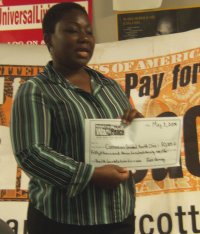And, from the edition of The Spartanburg Herald:
Couple Refused To Support War
Fremont, Mich. (AP) — Paul Snyder and his wife, Addie, saw their home sold for the taxes they refused to pay to support the wars they opposed.
But the property — sold at an Internal Revenue Service bid opening at the Fremont Post Office — went to a friend and the Snyders said they will buy it back.
The purchaser was identified as Carol Blizzard of Holton in adjoining Muskegon County. The high bid was $8,460.
However, the IRS said the Snyders actually owe only $3,023 for taxes they withheld .
IRS officials refused to say how high they set a minimum bid in conducting the sale and that prompted the 41-year-old Mrs. Snyder’s only public outcry. “Oh, that’s not fair!” she shouted.
The Snyders, surrounded by about 100 supporters and newsmen, said afterward that they believe their protest was worthwhile.
“We have not given up. They had to extract it from us,” said Snyder, 42, a veterinarian.
The Snyders withheld the portion of their taxes they believed went to the Defense Department based upon that agency’s share of the national budget. Snyder said the total amounted to about 45 per cent of their taxes.
And he said they will continue their protest and refuse to pay taxes they believe are used for wars. In fact, they have not paid that portion of their taxes, he said.
Mrs. Snyder said that Cambodian invasion was responsible for turning a “pair of hard-working Republicans” into war protesters and tax evaders.
“We had tried to ignore the war up to that time,” she said.
Instead, they used the money for alternative purposes — “spent mostly in Newaygo County on rural poverty projects” — because “we believe in paying taxes.”
Another report adds: “An IRS spokesman in Grand Rapids refused to disclose the amount of the losing bids. Other sources, however, said many bids of $1 or less were made. The New York City War Tax Resistance group said “a couple hundred bids of a minimal amount were made.”
This, according to an earlier article in The Argus-Press, was a tactic modeled on foreclosure auction disruption tactics during the Great Depression:
Members of the Newaygo County Citizens for Peace took an ad in today’s editions of the weekly Fremont Times Indicator urging those who oppose wars to bid for the property of Paul Snyder…
Listing a variety of reasons for supporting the Snyders, the peace group’s ad urged county residents, “If you agree with us… please make a bid on their (the Snyder’s) property.”
Making a bid of pennies for farm property being forclosed for failure to meet mortgages was a common tactic among angry farmers during the Depression. If their bids succeeded, the property was returned to its owner and the mortgage torn up.
In some such cases, entire farms plus their livestock, equipment and home furnishings sold for as little as $2.

